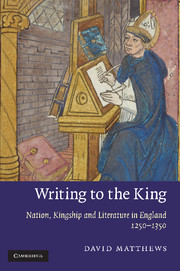Book contents
- Frontmatter
- Contents
- Preface
- Abbreviations
- Introduction
- 1 Defending Anglia
- 2 Attacking Scotland: Edward I and the 1290s
- 3 Regime change
- 4 The destruction of England: crisis and complaint, c.1300–41
- 5 Love letters to Edward III
- Envoy
- Appendix: The tail-rhyme poems of Langtoft's chronicle
- Notes
- Bibliography
- Index
- CAMBRIDGE STUDIES IN MEDIEVAL LITERATURE
Envoy
Published online by Cambridge University Press: 07 May 2010
- Frontmatter
- Contents
- Preface
- Abbreviations
- Introduction
- 1 Defending Anglia
- 2 Attacking Scotland: Edward I and the 1290s
- 3 Regime change
- 4 The destruction of England: crisis and complaint, c.1300–41
- 5 Love letters to Edward III
- Envoy
- Appendix: The tail-rhyme poems of Langtoft's chronicle
- Notes
- Bibliography
- Index
- CAMBRIDGE STUDIES IN MEDIEVAL LITERATURE
Summary
How ‘writing to the king’ might be understood in the late fourteenth century is given a clear statement by one fictional Southwark tavern–keeper. In the Canterbury Tales, when the Host turns to the Clerk he asks for a ‘murie thyng of aventures’, warning him to speak ‘pleyn’ so that every one can understand. Obviously fearing the learned Clerk's capacity for rhetoric, Harry advises: ‘Youre termes, youre colours, and youre figures, / Keepe hem in stoor til so be ye endite / Heigh style, as whan that men to kynges write.’
Harry Bailly frequently misses the mark on the Canterbury pilgrimage and he does so again here. He forgets or is unaware that the mechanism of petitioning the king which had arisen with parliament by the early fourteenth century was still available. The Clerk himself might well be called upon, in his future life, by an individual or a community to draft a letter to the king: his tale shows that he is already deeply interested in the issue of mediation between ruler and people. But the Clerk would know that ‘heigh style’ was not a necessary feature of petitionary writing.
As a literary strategy, writing to the king could be described as just coming into its own in the Ricardian period, when it was explored by Chaucer, Gower, and various anonymous writers, later succeeded by Hoccleve and Lydgate.
- Type
- Chapter
- Information
- Writing to the KingNation, Kingship and Literature in England, 1250–1350, pp. 156 - 160Publisher: Cambridge University PressPrint publication year: 2010



